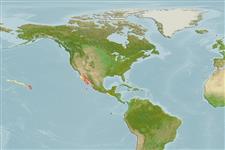Elasmobranchii (Haie und Rochen) (sharks and rays) >
Myliobatiformes (Stingrays) >
Urotrygonidae (American round stingrays)
Etymology: Urobatis: Greek,oura = tail + Greek, batis, batidos = a ray (Raja sp.) (Ref. 45335).
More on authors: Osburn & Nichols.
Environment: milieu / climate zone / depth range / distribution range
Ökologie
seewasser demersal; tiefenbereich 1 - 109 m (Ref. 96339), usually 1 - 35 m (Ref. 9265). Tropical; 31°N - 13°N
Eastern Central Pacific: Gulf of California and scattered localities of Mexico.
Size / Gewicht / Alter
Maturity: Lm ? range ? - ? cm
Max length : 50.0 cm TL Männchen/unbestimmt; (Ref. 127668); 58.4 cm TL (female); max. veröff. Alter: 4 Jahre (Ref. 127668)
Found in bays, lagoons and estuaries; also on sandy bottoms near reefs (Ref. 9265). Feeds on crustaceans and small fishes (Ref. 37955), and worms (Ref. 12951). Venomous spine on tail.
Life cycle and mating behavior
Geschlechtsreife | Fortpflanzung | Ablaichen | Eier | Fecundity | Larven
McEachran, J.D., 1995. Urolophidae. Rayas redondas. p. 786-792. In W. Fischer, F. Krupp, W. Schneider, C. Sommer, K.E. Carpenter and V. Niem (eds.) Guia FAO para Identification de Especies para lo Fines de la Pesca. Pacifico Centro-Oriental. 3 Vols. FAO, Rome. (Ref. 9265)
IUCN Rote Liste Status (Ref. 130435: Version 2024-2)
Nutzung durch Menschen
Fischereien: kleinfischerei
Tools
Zusatzinformationen
Download XML
Internet Quellen
Estimates based on models
Preferred temperature (Ref.
123201): 20.6 - 27.7, mean 23.3 °C (based on 42 cells).
Phylogenetic diversity index (Ref.
82804): PD
50 = 0.5078 [Uniqueness, from 0.5 = low to 2.0 = high].
Bayesian length-weight: a=0.01413 (0.00578 - 0.03452), b=3.07 (2.86 - 3.28), in cm total length, based on LWR estimates for this (Sub)family-body shape (Ref.
93245).
Trophic level (Ref.
69278): 3.3 ±0.47 se; based on food items.
Widerstandsfähigkeit (Ref.
120179): niedrig, Verdopplung der Population dauert 4,5 - 14 Jahre. (Assuming fecundity<100).
Fishing Vulnerability (Ref.
59153): Moderate vulnerability (43 of 100).
Nutrients (Ref.
124155): Calcium = 24.6 [3.3, 473.3] mg/100g; Iron = 0.734 [0.067, 8.603] mg/100g; Protein = 19.3 [14.1, 24.6] %; Omega3 = 0.137 [0.042, 0.426] g/100g; Selenium = 43.3 [7.9, 211.2] μg/100g; VitaminA = 14.9 [1.0, 174.9] μg/100g; Zinc = 1.04 [0.07, 12.42] mg/100g (wet weight);
